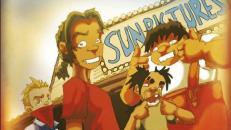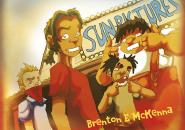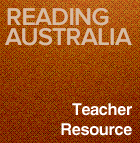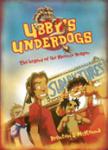AustLit
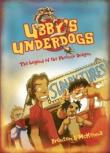 957394385132275642.jpg
957394385132275642.jpg
Latest Issues
AbstractHistoryArchive Description
Ubby is a smart, young Aboriginal girl who is twice as tough as the streets she lives on. She is the leader of a rag-tag group of youth known as the 'Underdogs'. When Ubby meets Sai Fong, a Chinese girl who has arrived fresh off the boat from Beijing, street life in Broome takes on a multitude of new dimensions. From the moment the two girls meet, they find themselves immersed in a series of bizarre adventures influenced by Aboriginal and Chinese myths and legend, and secrets never before exposed.
'This is a heroic tale that measures the limits of courage and friendship. Ubby's Underdogs: The Legend of the Phoenix Dragon boasts a multifaceted narrative with staggering graphic detail in order to introduce a series of complex characters with links to other worlds. Amidst a backdrop of fictionalised Aboriginal and Chinese mythology in the unique multicultural town of Broome, Brenton's first graphic novel leaves you gasping for air and in anticipation of things to come.'
(Source: Magabala Books website; http://www.magabala.com)
Reading Australia
This work has Reading Australia teaching resources.
Unit Suitable For
AC: Year 7 (NSW Stage 4)
Themes
bravery, bullying, colonialism, corruption, friendship, gender roles and stereotypes, humour, interracial, magic realism, Myths and Legends, racism, satire, social class
General Capabilities
Critical and creative thinking, Ethical understanding, Information and communication technology, Intercultural understanding, Literacy, Personal and social
Cross-curriculum Priorities
Aboriginal and Torres Strait Islander histories and cultures, Asia and Australia's engagement with Asia
Notes
-
Ages: upper primary and young adults.
Affiliation Notes
-
This work is affiliated with the AustLit subset Asian-Australian Children's Literature and Publishing because it contains Chinese characters, with strong references to Chinese mythology and culture.
Publication Details of Only Known VersionEarliest 2 Known Versions of
Works about this Work
-
Reading and Viewing : [Indigenous Texts for Year 7 - 10]
2019
single work
criticism
— Appears in: English in Australia , vol. 54 no. 1 2019; (p. 76-82) -
Ubby's Underdogs : A Transformative Vision of Australian Community
2016
single work
criticism
— Appears in: Papers : Explorations into Children's Literature , vol. 24 no. 1 2016; (p. 101-131)"The ‘Ubby’s Underdogs’ books are the first graphic novels published by Magabala Books,representing an innovation which maintains the inventiveness characteristic of Magabala’s picture books. The trilogy’s treatment of the Underdogs’ exploits in multicultural Broome foregrounds the encounter between Aboriginal and Chinese cultural traditions. By drawing on a blend of cultural signifiers, the novels display the carnivalesque qualities described by Mikhail Bakhtin in Rabelais and His World (1984). In McKenna’s novels carnivalesque scenes, polyglot voices and intercultural dialogues give rise to a transformative vision of a community which resists monologic authoritarianism. Like graphic novels more generally, the Underdogs novels rely on visual, verbal and cultural stereotypes to enable rapid identification of characters of various ethnicities. They transform such stereotypical and exoticised figures through modes of representation and narrative which privilege the ‘culture of folk carnival humour’ (Bakhtin 1984, p. 4) to present negotiations between and across cultures in the setting of post-war Broome." (Introduction)
-
Getting Indigenous Voices into the Classroom
2014
single work
essay
— Appears in: Splash (ABC) 2013-; 'Teaching books by Indigenous authors has a huge impact on both Indigenous and non-Indigenous students, explains author Ellen van Neerven.' -
[Review] The Legend of the Phoenix Dragon
2012
single work
review
— Appears in: English in Australia , vol. 47 no. 3 2012; (p. 92)
— Review of Ubby's Underdogs : The Legend of the Phoenix Dragon 2011 single work graphic novel -
[Review] The Legend of the Phoenix Dragon
2011
single work
review
— Appears in: Reading Time : The Journal of the Childrens' Book Council of Australia , August vol. 55 no. 3 2011; (p. 27)
— Review of Ubby's Underdogs : The Legend of the Phoenix Dragon 2011 single work graphic novel
-
Off the Shelf : Graphic Novel
2011
single work
review
— Appears in: The Saturday Age , 7 May 2011; (p. 28)
— Review of Ubby's Underdogs : The Legend of the Phoenix Dragon 2011 single work graphic novel -
[Review] The Legend of the Phoenix Dragon
2011
single work
review
— Appears in: The Advertiser , 25 June 2011; (p. 27)
— Review of Ubby's Underdogs : The Legend of the Phoenix Dragon 2011 single work graphic novel -
[Review] The Legend of the Phoenix Dragon
2011
single work
review
— Appears in: Magpies : Talking About Books for Children , May vol. 26 no. 2 2011; (p. 42)
— Review of Ubby's Underdogs : The Legend of the Phoenix Dragon 2011 single work graphic novel -
[Review] The Legend of the Phoenix Dragon
2011
single work
review
— Appears in: Fiction Focus : New Titles for Teenagers , vol. 25 no. 3 2011; (p. 27)
— Review of Ubby's Underdogs : The Legend of the Phoenix Dragon 2011 single work graphic novel -
Review : Ubby's Underdogs
2011-2012
single work
review
— Appears in: Southpaw , no. 1 2011-2012; (p. 164-166)
— Review of Ubby's Underdogs : The Legend of the Phoenix Dragon 2011 single work graphic novel -
Getting Indigenous Voices into the Classroom
2014
single work
essay
— Appears in: Splash (ABC) 2013-; 'Teaching books by Indigenous authors has a huge impact on both Indigenous and non-Indigenous students, explains author Ellen van Neerven.' -
Ubby's Underdogs : A Transformative Vision of Australian Community
2016
single work
criticism
— Appears in: Papers : Explorations into Children's Literature , vol. 24 no. 1 2016; (p. 101-131)"The ‘Ubby’s Underdogs’ books are the first graphic novels published by Magabala Books,representing an innovation which maintains the inventiveness characteristic of Magabala’s picture books. The trilogy’s treatment of the Underdogs’ exploits in multicultural Broome foregrounds the encounter between Aboriginal and Chinese cultural traditions. By drawing on a blend of cultural signifiers, the novels display the carnivalesque qualities described by Mikhail Bakhtin in Rabelais and His World (1984). In McKenna’s novels carnivalesque scenes, polyglot voices and intercultural dialogues give rise to a transformative vision of a community which resists monologic authoritarianism. Like graphic novels more generally, the Underdogs novels rely on visual, verbal and cultural stereotypes to enable rapid identification of characters of various ethnicities. They transform such stereotypical and exoticised figures through modes of representation and narrative which privilege the ‘culture of folk carnival humour’ (Bakhtin 1984, p. 4) to present negotiations between and across cultures in the setting of post-war Broome." (Introduction)
-
Reading and Viewing : [Indigenous Texts for Year 7 - 10]
2019
single work
criticism
— Appears in: English in Australia , vol. 54 no. 1 2019; (p. 76-82)
Awards
- Broome, Kimberley area, North Western Australia, Western Australia,


